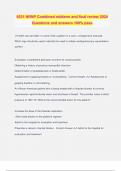Mi final cardiovascular - Study guides, Class notes & Summaries
Looking for the best study guides, study notes and summaries about Mi final cardiovascular? On this page you'll find 728 study documents about Mi final cardiovascular.
Page 3 out of 728 results
Sort by
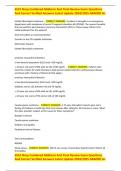
-
6531 Nrnp Combined Midterm And Final Review Exam Questions And Correct Verified Answers
- Exam (elaborations) • 232 pages • 2024
-
- $11.99
- + learn more
Initiate fibrinolytic treatment - CORRECT ANSWERS A patient is brought to an emergency department with symptoms of acute ST-segment elevation MI (STEMI). The nearest hospital that can perform percutaneous coronary intervention (PCI) is 3 hours away. What is the initial treatment for this patient? Give the patient an oral beta blocker Transfer to the PCI-capable institution Administer heparin Initiate fibrinolytic treatment previous myocardial infarction. a low-density lipoprotein (LDL) ...
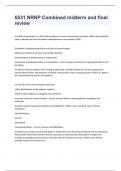
-
6531 NRNP Combined midterm and final review 2023/2024 already psassed
- Exam (elaborations) • 192 pages • 2023
-
Available in package deal
-
- $26.99
- + learn more
6531 NRNP Combined midterm and final reviewA health care provider in a clinic finds a patient in a room, unresponsive and pale. Which sign should be used to identify the need to initiate cardiopulmonary resuscitation (CPR)? Evaluation of peripheral perfusion and level of consciousness Obtaining a history of previous myocardial infarction Determination of pulselessness or bradycardia Assessment of gasping breaths or not breathing - correct answers Assessment of gasping breaths or not breath...
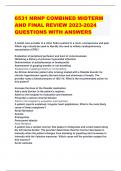
-
6531 NRNP COMBINED MIDTERM AND FINAL REVIEW 2023-2024 QUESTIONS WITH ANSWERS
- Exam (elaborations) • 165 pages • 2024
-
- $18.49
- + learn more
6531 NRNP COMBINED MIDTERM AND FINAL REVIEW QUESTIONS WITH ANSWERS A health care provider in a clinic finds a patient in a room, unresponsive and pale. Which sign should be used to identify the need to initiate cardiopulmonary resuscitation (CPR)? Evaluation of peripheral perfusion and level of consciousness Obtaining a history of previous myocardial infarction Determination of pulselessness or bradycardia Assessment of gasping breaths or not breathing Assessment of gasping breaths...
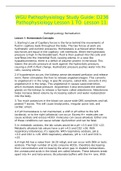
-
WGU Pathophysiology Study Guide: D236 Pathophysiology Lesson 1 TO Lesson 11
- Class notes • 28 pages • 2022
-
Available in package deal
-
- $18.50
- 4x sold
- + learn more
WGU Pathophysiology Study Guide: D236 Pathophysiology Lesson 1 TO Lesson 11 WGU Pathophysiology Study Guide: D236 Pathophysiology Lesson 1 TO Lesson 11: Pathophysiology Remediation Lesson 1: Homeostasis Concepts 1. Starling's Law of Capillary forces is the force behind the movements of fluid in capillary beds throughout the body. The two forces at work are hydrostatic and osmotic pressures. Homeostasis is achieved when these two forces are equal in the capillary- cell interfaces. When ...
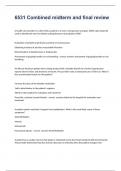
-
6531 Combined midterm and final review 2023/2024 already passed
- Exam (elaborations) • 216 pages • 2023
-
- $26.49
- + learn more
6531 Combined midterm and final reviewA health care provider in a clinic finds a patient in a room, unresponsive and pale. Which sign should be used to identify the need to initiate cardiopulmonary resuscitation (CPR)? Evaluation of peripheral perfusion and level of consciousness Obtaining a history of previous myocardial infarction Determination of pulselessness or bradycardia Assessment of gasping breaths or not breathing - correct answers Assessment of gasping breaths or not breathing ...
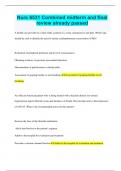
-
Nurs 6531 Combined midterm and final review already passed
- Exam (elaborations) • 351 pages • 2023
-
Available in package deal
-
- $12.99
- + learn more
Nurs 6531 Combined midterm and final review already passed A health care provider in a clinic finds a patient in a room, unresponsive and pale. Which sign should be used to identify the need to initiate cardiopulmonary resuscitation (CPR)? Evaluation of peripheral perfusion and level of consciousness Obtaining a history of previous myocardial infarction Determination of pulselessness or bradycardia Assessment of gasping breaths or not breathing Assessment of gasping breaths or not breathing ...
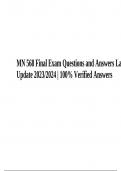
-
MN 568 Final Exam Questions and Answers Latest Update 2023/2024 100% Verified Answers
- Exam (elaborations) • 21 pages • 2023
-
Available in package deal
-
- $16.49
- + learn more
MN 568 Final Exam Questions and Answers Latest Update 2023/2024 100% Verified Answers. A patient is seen with complaints of diarrhea. Which of the following should be included in the patient’s differential diagnosis? Question options: a) Gastroenteritis b) Inflammatory bowel disease c) Lactase deficiency d) All of the above Question 6 2 / 2 points There are four stages of heart failure, classified as A to D, that describe the evolution and progression of disease. In which stage are p...
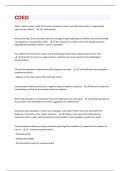
-
CDEO QUESTIONS & ANSWERS VERIFIED 100% CORRECT
- Exam (elaborations) • 15 pages • 2024
- Available in package deal
-
- $7.99
- + learn more
Which system is given credit for the exam component when a provider documents "no appreciable edema in the ankles?" - Cardiovascular When providing CDI to a provider, does the message change depending on whether you are performing a prospective or retrospective audit? - Yes, because the auditor cannot ask leading questions regarding documentation before a claim is submitted. The surgeon documents liver cancer, but the pathology report states angiosarcoma of liver. You: - Code the liver c...
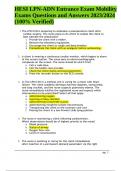
-
HESI LPN-ADN Entrance Exam Mobility Exam Questions and Answers 2024 (100% Verified)
- Exam (elaborations) • 78 pages • 2024
-
- $18.49
- + learn more
HESI LPN-ADN Entrance Exam Mobility Exam Questions and Answers 2024 (100% Verified). The LPN/LVN is preparing to ambulate a postoperative client after cardiac surgery. The nurse plans to do which to enable the client to best tolerate the ambulation? 1. Provide the client with a walker. 2. Remove the telemetry equipment. 3. Encourage the client to cough and deep breathe. 4. Premedicate the client with an analgesic before ambulating. 2. A client is wearing a continuous cardiac monitor, whic...

$6.50 for your textbook summary multiplied by 100 fellow students... Do the math: that's a lot of money! Don't be a thief of your own wallet and start uploading yours now. Discover all about earning on Stuvia

